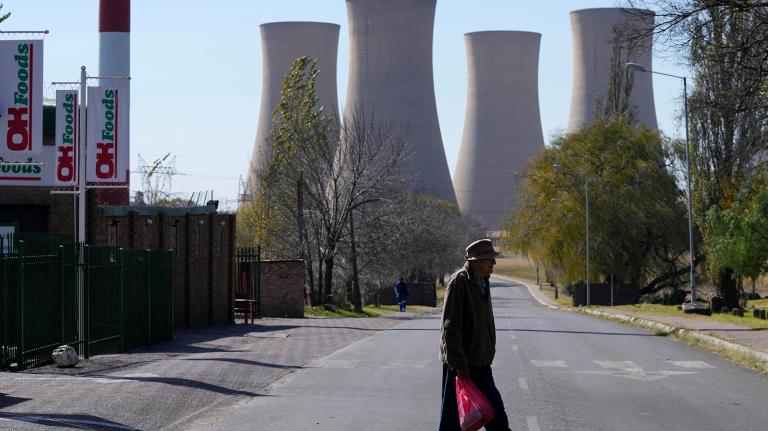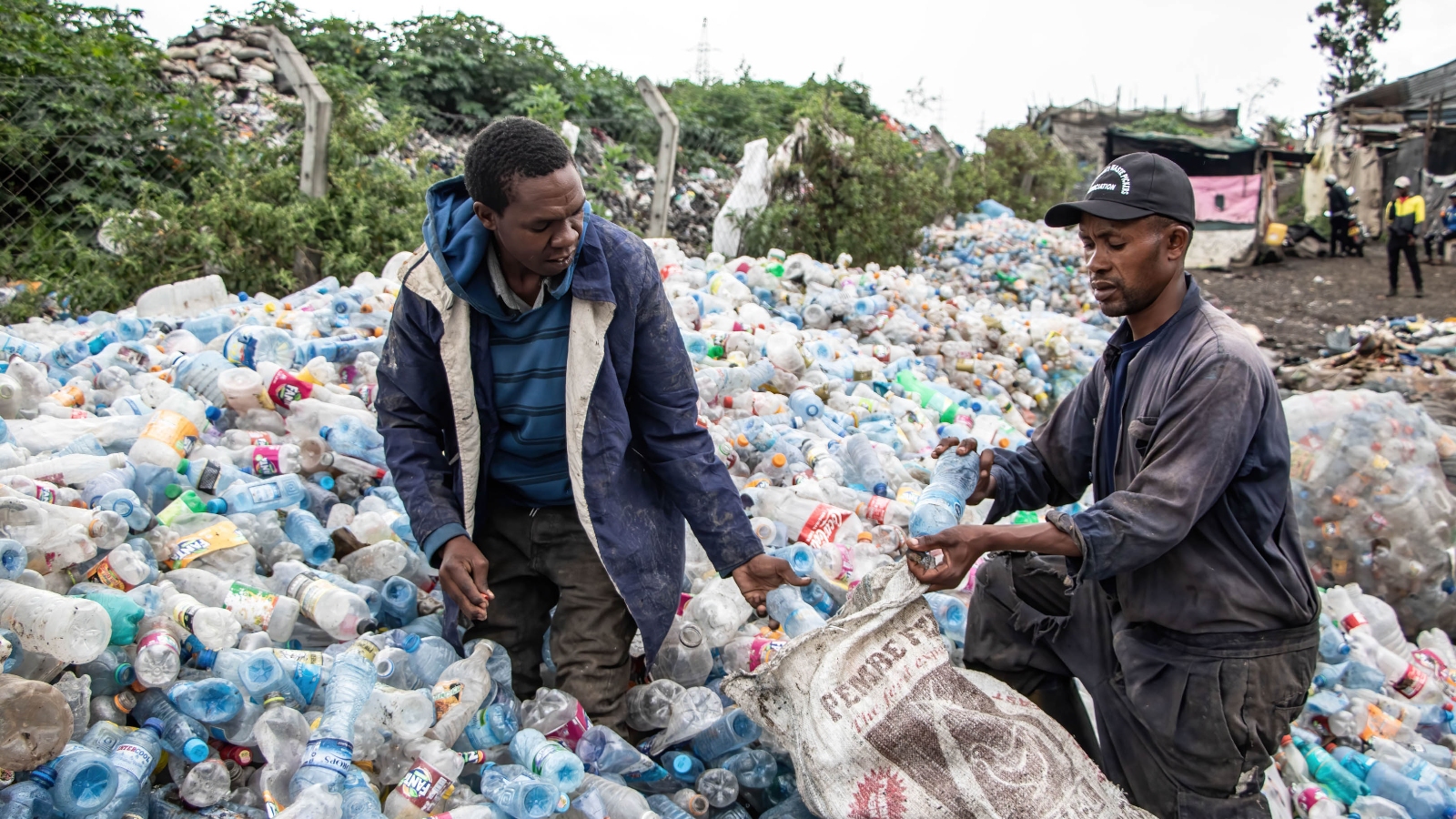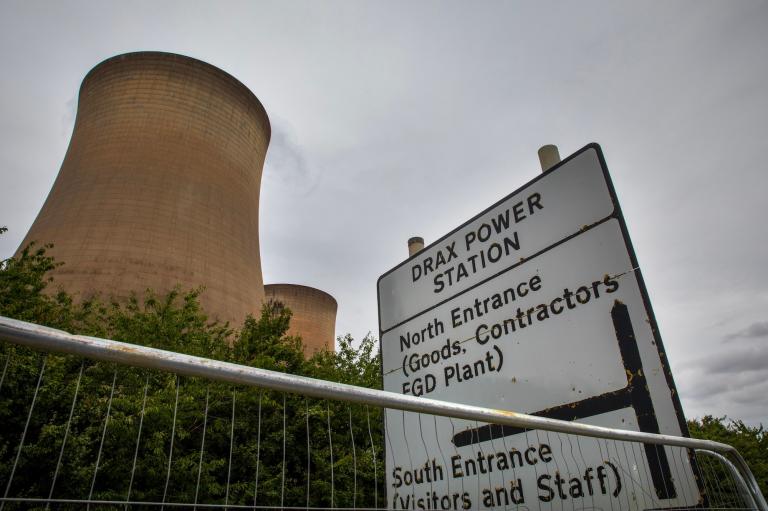A little over a decade ago, Luyanda Hlatshwayo lived a double life. During the day, he woke early, donned a balaclava, and went through bins on the streets of Johannesburg, South Africa. He learned which types of materials could and could not be recycled, as he sifted through PET bottles, polystyrene foam, and multilayered plastic packaging. He kept a running tab on the going rate for recycled plastic, which rose and fell with the price of oil. At night, he returned to his family, who believed he still worked in hospitality.
“At some point I felt the need to take off the balaclava — not for everyone, but mainly for me,” Hlatshwayo told Grist. Over time, he began to take pride in his work, as he was now an entrepreneur serving a clear environmental purpose. In 2017, he and his fellow organizers began to advocate on behalf of the city’s 8,000 waste pickers. They pitched projects to municipal governments, representing themselves as environmental agents, incentivized to collect every piece of plastic, paper, or metal they could find.
While he still collects recyclables on Mondays and Tuesdays, Hlatshwayo now spends much of his time advocating for the rights of waste pickers at universities, resident councils, and corporate conferences. “Every street, every bin, every landfill — that’s where we are, because that’s where the value is,” he said at an industry conference last year.
In 2021, single-use plastic waste grew to more than 130 million tons worldwide, while governments around the globe ramped up efforts to address plastic pollution. But as cities, countries, and companies face increasing pressure to reduce their waste, they risk sidelining workers like Hlatshwayo. When recycling collection services are formalized, or outsourced to private companies, they often monopolize waste streams that more than 20 million waste pickers around the world rely on for income.
Reforms like these may not even decrease the volume of plastic in landfills or the environment, in part because they disrupt an informal sector that currently captures over 60 percent of all plastic recycled. In South Africa, this rate reaches up to 90 percent of all post-consumer packaging, and only 10 percent of urban households sort their own waste. By scouring alleyways on foot and sorting dumpsters by hand, waste pickers often go where few formal systems can follow. They can achieve collection rates that, though largely invisible, are far higher than systems that rely on residents or optimize for speed.
A 2020 pilot program in Johannesburg measured the volume of recyclable materials collected by waste pickers in the suburbs of Brixton and Auckland Park, finding recycling rates so high that, if extrapolated across the city, it would take all 8,000 waste pickers just 28 days to gather as much recycled material as the city and its contractors collected in one year.
“Private companies are not capable of extracting anywhere near the amount of recyclables that reclaimers are,” said Melanie Samson, an associate professor at the University of Johannesburg. “There’s no comparison, in terms of the efficacy of the recycling rate.”
While Hlatshwayo’s organizing efforts advance at the local level, a similar fight is taking place on the world stage. This week, delegates from over 175 countries arrived in Nairobi, Kenya, to negotiate the terms of a global treaty intended to end plastic pollution. Waste pickers from nine countries — South Africa, Kenya, Senegal, India, Bangladesh, Brazil, Chile, Italy, and the United States — will make their case through a series of events and interventions in treaty discussions.
Inger Andersen, executive director of the United Nations Environment Programme, has called the plastics treaty the most significant multilateral environmental deal since the Paris climate accord. Once active, the treaty will legally bind United Nations member states to abide by its terms. (This week’s meeting is the third of five planned sessions to hammer out the details; the first took place in November 2022 and the last is scheduled for late 2024, with the treaty potentially in force as early as 2025.)
To protect their rights as workers, waste pickers are calling for explicit text requiring national governments and plastic producers to identify local waste picker leaders, include them in policy discussions, and account for their current contributions in the design of new collection systems. Failing to consider these demands from Hlatshwayo and others within the International Alliance of Waste Pickers — a union of waste picker organizations representing more than 460,000 workers in 34 countries — could have dire consequences for millions of the world’s poorest workers.
“If you were to cancel the production of plastic bottles, PET bottles — it’s great for the environment, yes we all agree — but there’s so much social impact connected to that plastic bottle,” Hlatshwayo told Grist. “A lot of livelihoods could be lost through a simple decision that is not properly communicated.”
Thousands of waste pickers are already fighting to keep their livelihoods. The Environmental Justice Atlas, a resource produced by the Autonomous University of Barcelona, has documented dozens of cases around the world where privatization in the waste sector has threatened informal workers’ access to materials, including landfill closures and the development of incineration plants.
Nothing about the treaty has been fully ironed out yet, and the enormous uncertainty has locked environmental groups, industry representatives, and other interest groups in a war of communications. Each needs to convince the delegates of member states, who are the only people with the power to bring issues to the floor, that their strategies to reduce plastic pollution are the most effective, just, or economically viable.
Will there be, for instance, globally agreed upon targets, or will each country define these targets for themselves? Will there be a cap on the primary production of plastic, or should companies simply be required to use more recycled material? The suite of potential measures stretches from drastically reducing single-use plastics to phasing out chemicals of concern, like BPA, POPs, and PFAS, which remain in global circulation despite some regional bans.
In August, the United Nations Environment Programme released a “zero draft” of the treaty — a comprehensive outline, which provides options for different pollution reduction strategies that were raised during the first two sessions. During the week’s negotiations thus far, many states expressed their support for the zero draft, while a new coalition of countries — including Saudi Arabia and Iran — voiced interest in significant changes, likely toward a less ambitious treaty.
The zero draft drew widespread support from environmental groups for its attention to curtailing plastic production, eliminating single-use plastics and chemicals of concern, promoting transparency in trade and labeling, supporting a “just transition” away from the status quo, and developing future targets.
At the same time, some called for greater specificity on key issues, like the role of producers in addressing plastic waste. The Environmental Investigations Agency, a global nonprofit, suggested that the treaty emphasize “reuse” as a priority for plastic producers, which would encourage companies to use less material overall, rather than relying on imperfect recycling systems.
Toward the end of the document, waste pickers appeared in three separate clauses. The language called for improved working conditions, integration into a “safe” plastics value chain, and the use of revenue from collection systems run by plastic producers for waste picker support or retraining.
For waste pickers, these improvements could look different depending on the local context, but they might include the provision of dedicated warehouses for sorting materials, trucks for transporting their wares, or protective equipment for working in hazardous conditions. While some waste picker cooperatives already have government contracts, as in Brazil and Colombia, integration for others will mean recognizing their work in local laws, including their contributions in national statistics, and providing salaries, because the vast majority of their income relies on the ever-fluctuating price of materials on the global market.
Given this variability, what a just transition means in the context of plastic policy is an ongoing dialogue. In South Africa, a working group between waste picker organizations, companies, and the government is moving forward on several fronts, including by building a database of decentralized workers and implementing a service fee per kilogram collected in certain neighborhoods.
The inclusion of “just transition” language in the zero draft was a major win for the waste pickers’ movement, one that reflected the strength of their advocacy and the number of member states willing to bring their issues to the floor, including Brazil, Uruguay, and the Philippines.
But according to Lucia Fernández, acting general secretary of the International Alliance of Waste Pickers, now is no time to rest easy. Her colleagues still need to ensure that these clauses make it to the final draft and that their specific measures are defined clearly, so the treaty can be enforced. Ideally, they will account for the way the work can be formal or informal, part-time or full-time, and organized or decentralized.
Bert De Wel, the climate policy officer for the International Trade Union Confederation, an umbrella organization for national trade unions, was surprised by the size and capacity of the waste pickers when they first arrived in force at the initial plastics treaty meetings.
“It’s due to them that [a] just transition and the workers’ aspects are mentioned in the [United Nations] mandate,” he said, adding that his organization looks forward to partnering with the alliance in the future.
Despite this solidarity, many waste pickers are in a more precarious position than other workers. At the base of a recycling hierarchy — in which waste pickers sell to waste collectors, who sell to buyers and brokers, who sell the aggregate materials to a recycling company — waste pickers are not only the most populous participants in the supply chain, but also the farthest from formal recognition, profits, and security. If countries are not careful, they could also disrupt the foundation of their recycling systems: A 2017 tax on plastic products in India actually reduced recycling rates by discouraging immediate buyers from paying waste pickers higher rates.
While the debate rages on in Kenya, Hlatshwayo decided to stay at home in Johannesburg, where he can see tangible improvements taking place in his city’s recycling system and plastic producers’ cooperation with waste pickers. In his city, he said, they are innovating new business models and community engagement, and these stories are not always documented at the national level.
“Our governments are rushing into making decisions internationally without even knowing what they’re doing locally,” Hlatshwayo said. “We’ve mastered the art of collecting and diverting all of this plastic … Come and integrate what is already working.”




